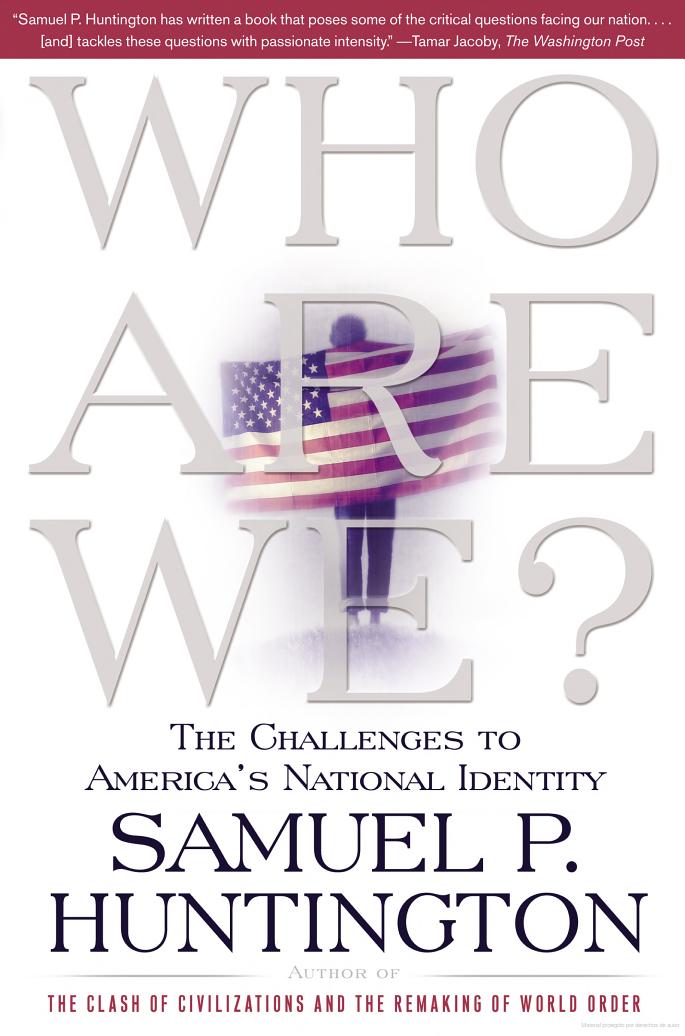Who Are We? Summary

4 min read ⌚
 The Challenges to America’s National Identity
The Challenges to America’s National Identity
American identity may have been a questionable assumption three centuries ago, but, nowadays, it’s so fixed and ubiquitous that even non-Americans want to define themselves through it.
Well, not if you ask renowned political scientist Samuel P. Huntington. In “Who Are We?”, he claims that American identity is under threat by Hispanic immigration. And that we must do something about it before it’s too late.
About Samuel P. Huntington

Samuel P. Huntington was an American academic and political scientist. He worked as a Professor at Harvard for more than half a century. He is most famous for his 1993 article, “The Clash of Civilizations” which would grow into the same-titled oft-cited bestseller three years later.
Huntington has written many other books, including “The Soldier and the State” and “The Third Wave.”
“Who Are We? Summary”
Most of the people, writes Samuel Huntington in “Who Are We?” believe that the American Creed is the core of the American identity. However, it is something much more complex and much less secular. And, in his opinion, it is currently under serious threat.
American identity probably began with the British colonialists. Sometime in the 18th century, they stopped considering themselves as merely British. And during the next century, they evolved a very specific identity which we now known as American.
So, what are the fundamental tenets of this identity?
Well, according to most of the world, the “principles of liberty, equality, individualism, representative government, and private property.” This is what the American Creed actually is. It is what makes America exceptional. Because, as G. K. Chesterton wrote in 1922, it was “the only nation in the world that is founded on a creed.”
However, in Huntington’s opinion, this is simply not true. In fact, the very same year Chesterton wrote the above quoted sentence, numerous Eurasian republics united to form another nation founded on a creed: the Soviet Union.
And during the 20th century, few other socialist countries followed suit, such as the Czech Republic and Yugoslavia.
Socialism aside, these three have two things in common. First of all, they all attempted to unite different nationalities and cultures on ideology only. And secondly – they all collapsed.
According to “Who Are We?” the fact that the United Sates hasn’t collapsed is evidence that the American Creed wasn’t the only unifying principle.
In fact, it was the creation, the upshot of something much more fundamental: Anglo-Protestant culture. America, in Huntington’s view, is not the only nation based on an ideology, but it is the only one formed against the backdrop of the English culture and Reformation values.
And this identity is the identity of the people who inhabited the original thirteen colonies. They weren’t “immigrants,” but “settlers.” And they shared between each other these five fundamental principles.
First of all, Christian religion. So much so, in fact, that nowadays, the U.S. is more religious than almost any other country in the Christian world. Secondly, the English language – the language of the original settlers. Thirdly, the work ethic – because you can’t work nothing in America.
Next, the rule of law: the Declaration of Independence makes this clear. And finally, limited state power – so fundamental that it’s exactly what the first ten Amendments to the Constitution are all about.
And all of this was fairly clear during the Cold War to anyone. It became once again – for a short period after the September 11 attacks and during the war against terrorism.
Unfortunately, according to Huntington, it’s bound to become history. Because, it’s been challenged by Spanish Catholic immigration.
The Hispanic population is pushing both for bilingualism and Catholic values. And this will probably result in an America much more akin to the Soviet Union: an ideologically united nation of subgroups with no discernible ethical or national identity.
Key Lessons from “Who Are We?”
1. Political Identities Don’t Last
2. The American Identity Is Based on Anglo-Protestant Foundation
3. Hispanic Immigration Has Challenged the Notion of American Identity
Political Identities Don’t Last
There are many types of identities. However, cultural and national identities have proven to be the long-lasting ones. If history has taught us anything, it’s that political and ideological identities last only as long as the cult of the leader does, be he a Stalin or a Tito. Once he dies, nations based on “identity of ideology” (communism in this case) split apart.
The American Identity Is Based on Anglo-Protestant Foundation
Contrary to popular belief, the American identity is not based on the American Creed, defined by Swedish Nobel Prize-winning economist Gunnar Myrdal as “the essential dignity of the individual human being, and of certain inalienable rights to freedom and justice.”
It’s based on a shared Anglo-Protestant past. Which, in turn, has ensued in five principles as the core of the American identity: English language, Protestant Christianity, the power of law, the value of individualism, and a dedicated work ethic.
Hispanic Immigration Has Challenged the Notion of American Identity
The greatest challenge to the notion of American identity wasn’t communism – and is certainly not terrorism. It’s immigration. Or, more precisely – Hispanic immigration. Because, Mexican immigrants aren’t interested in learning the English language or accepting the Protestant values. And, unlike any other immigrants, they have historical rights to claim some of the American territory.
This may – and in Huntington’s opinion will – lead to a bifurcated U.S., which will become merely a blanket term for many divergent subgroups.
Like this summary? We’d like to invite you to download our free 12 min app, for more amazing summaries and audiobooks.
“Who Are We?” Quotes
The post-September 11 flags symbolized America, but they did not convey any meaning of America. The explicit visual message of the Stars and Stripes is simply that America is a country that originally had thirteen and currently has fifty… Share on X When Osama bin Laden attacked America and killed several thousand people, he also did two other things. He filled the vacuum created by Gorbachev with an unmistakably dangerous new enemy, and he pinpointed America’s identity as a… Share on X The century in which national identity dominated other identities and in which Americans were enthusiastically nationalist and patriotic began to fade in the 1960s. Share on X Immigrants become citizens not because they are attracted to America’s culture and creed, but because they are attracted by government social welfare and affirmative action programs. Share on X The overwhelming bulk of the American people are committed to a national alternative and to preserving and strengthening the American identity that has existed for centuries. Share on X







